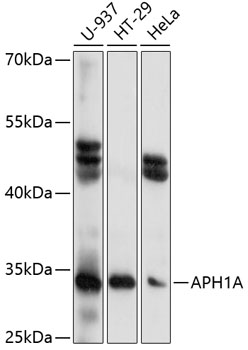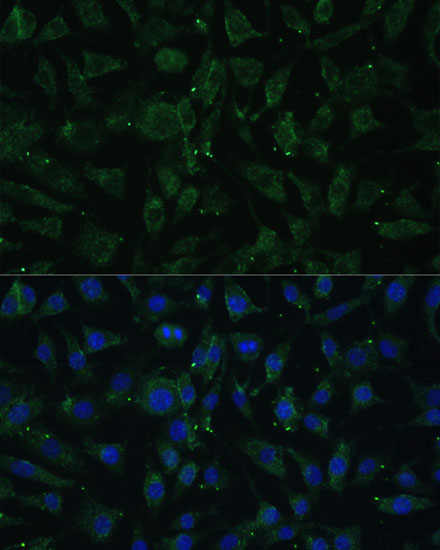Signal Transduction Antibodies 1
Anti-APH1A Antibody (CAB14666)
- SKU:
- CAB14666
- Product Type:
- Antibody
- Reactivity:
- Human
- Reactivity:
- Mouse
- Host Species:
- Rabbit
- Isotype:
- IgG
- Antibody Type:
- Polyclonal Antibody
- Research Area:
- Signal Transduction
Description
| Antibody Name: | Anti-APH1A Antibody |
| Antibody SKU: | CAB14666 |
| Antibody Size: | 20uL, 50uL, 100uL |
| Application: | WB IF |
| Reactivity: | Human, Mouse |
| Host Species: | Rabbit |
| Immunogen: | A synthetic peptide corresponding to a sequence within amino acids 200 to the C-terminus of human APH1A (NP_001071096.1). |
| Application: | WB IF |
| Recommended Dilution: | WB 1:500 - 1:2000 IF 1:50 - 1:100 |
| Reactivity: | Human, Mouse |
| Positive Samples: | U-937, HT-29, HeLa |
| Immunogen: | A synthetic peptide corresponding to a sequence within amino acids 200 to the C-terminus of human APH1A (NP_001071096.1). |
| Purification Method: | Affinity purification |
| Storage Buffer: | Store at -20'C. Avoid freeze / thaw cycles. Buffer: PBS with 0.02% sodium azide, 50% glycerol, pH7.3. |
| Isotype: | IgG |
| Sequence: | TSGL TFLN PWYE ASLL PIYA VTVS MGLW AFIT AGGS LRSI QRSL LCRR QEDS RVMV YSAL RIPP ED |
| Gene ID: | 51107 |
| Uniprot: | Q96BI3 |
| Cellular Location: | Endoplasmic reticulum membrane, Golgi apparatus, Golgi stack membrane, Multi-pass membrane protein |
| Calculated MW: | 20kDa/26kDa/28kDa |
| Observed MW: | 29kDa |
| Synonyms: | APH1A, 6530402N02Rik, APH-1, APH-1A, CGI-78 |
| Background: | This gene encodes a component of the gamma secretase complex that cleaves integral membrane proteins such as Notch receptors and beta-amyloid precursor protein. The gamma secretase complex contains this gene product, or the paralogous anterior pharynx defective 1 homolog B (APH1B), along with the presenilin, nicastrin, and presenilin enhancer-2 proteins. The precise function of this seven-transmembrane-domain protein is unknown though it is suspected of facilitating the association of nicastrin and presenilin in the gamma secretase complex as well as interacting with substrates of the gamma secretase complex prior to their proteolytic processing. Polymorphisms in a promoter region of this gene have been associated with an increased risk for developing sporadic Alzheimer's disease. Alternative splicing results in multiple protein-coding and non-protein-coding transcript variants. |
| UniProt Protein Function: | APH1A: Essential subunit of the gamma-secretase complex, an endoprotease complex that catalyzes the intramembrane cleavage of integral proteins such as Notch receptors and APP (beta-amyloid precursor protein). It probably represents a stabilizing cofactor for the presenilin homodimer that promotes the formation of a stable complex. Belongs to the APH-1 family. 2 isoforms of the human protein are produced by alternative splicing. |
| UniProt Protein Details: | Protein type:Endoplasmic reticulum; Membrane protein, integral; Apoptosis; Membrane protein, multi-pass Chromosomal Location of Human Ortholog: 1p36.13-q31.3 Cellular Component: endoplasmic reticulum; Golgi apparatus; integral to plasma membrane; membrane; plasma membrane Molecular Function:protein binding Biological Process: amyloid precursor protein catabolic process; ephrin receptor signaling pathway; membrane protein ectodomain proteolysis; membrane protein intracellular domain proteolysis; Notch receptor processing; Notch signaling pathway; positive regulation of apoptosis; positive regulation of catalytic activity; protein processing |
| NCBI Summary: | This gene encodes a component of the gamma secretase complex that cleaves integral membrane proteins such as Notch receptors and beta-amyloid precursor protein. The gamma secretase complex contains this gene product, or the paralogous anterior pharynx defective 1 homolog B (APH1B), along with the presenilin, nicastrin, and presenilin enhancer-2 proteins. The precise function of this seven-transmembrane-domain protein is unknown though it is suspected of facilitating the association of nicastrin and presenilin in the gamma secretase complex as well as interacting with substrates of the gamma secretase complex prior to their proteolytic processing. Polymorphisms in a promoter region of this gene have been associated with an increased risk for developing sporadic Alzheimer's disease. Alternative splicing results in multiple protein-coding and non-protein-coding transcript variants. [provided by RefSeq, Aug 2011] |
| UniProt Code: | Q96BI3 |
| NCBI GenInfo Identifier: | 37077707 |
| NCBI Gene ID: | 51107 |
| NCBI Accession: | Q96BI3.1 |
| UniProt Secondary Accession: | Q96BI3,Q5TB22, Q5TB23, Q969R6, Q9BVG0, Q9Y386, B4DQK0 |
| UniProt Related Accession: | Q96BI3 |
| Molecular Weight: | 20,977 Da |
| NCBI Full Name: | Gamma-secretase subunit APH-1A |
| NCBI Synonym Full Names: | aph-1 homolog A, gamma-secretase subunit |
| NCBI Official Symbol: | APH1A |
| NCBI Official Synonym Symbols: | APH-1; APH-1A; CGI-78; 6530402N02Rik |
| NCBI Protein Information: | gamma-secretase subunit APH-1A |
| UniProt Protein Name: | Gamma-secretase subunit APH-1A |
| UniProt Synonym Protein Names: | Aph-1alpha; Presenilin-stabilization factor |
| Protein Family: | Gamma-secretase |
| UniProt Gene Name: | APH1A |
| UniProt Entry Name: | APH1A_HUMAN |
View AllClose








